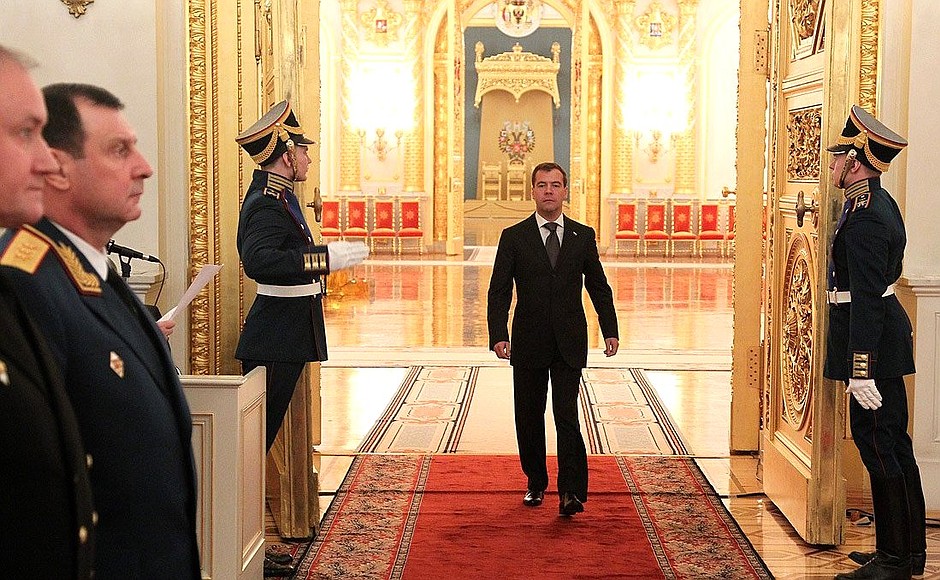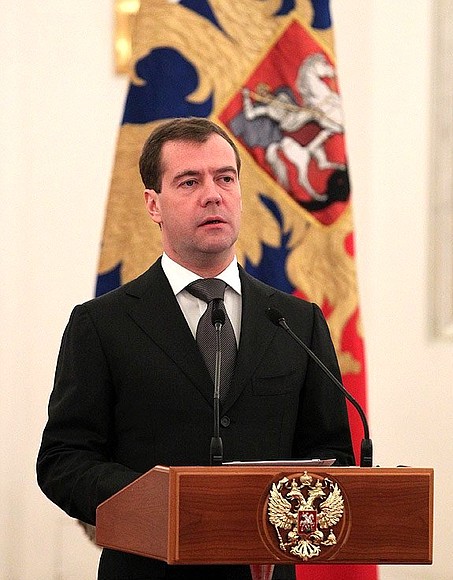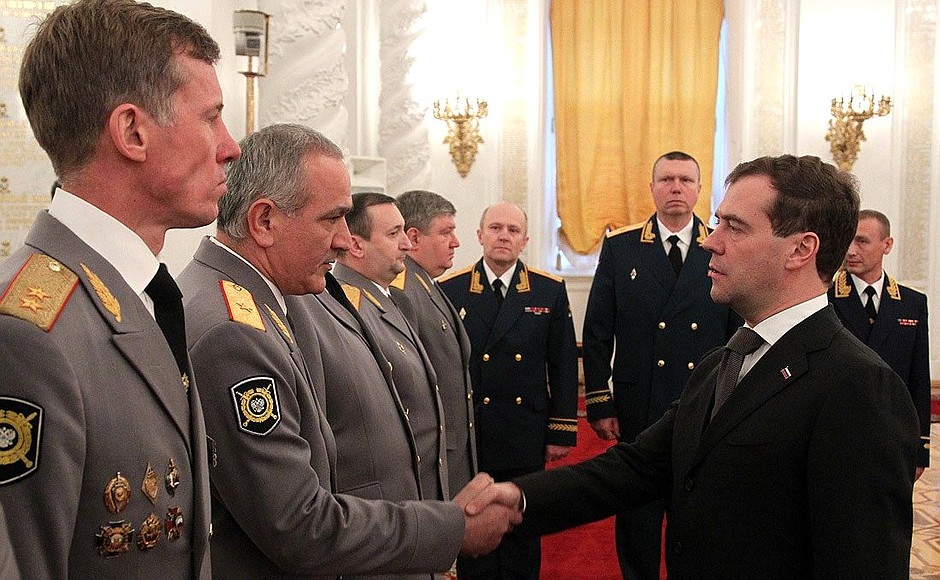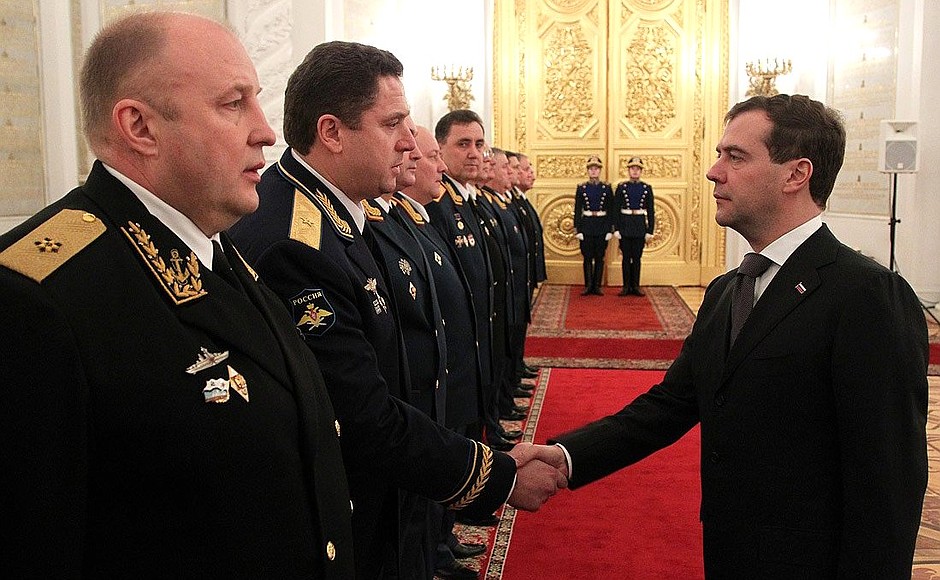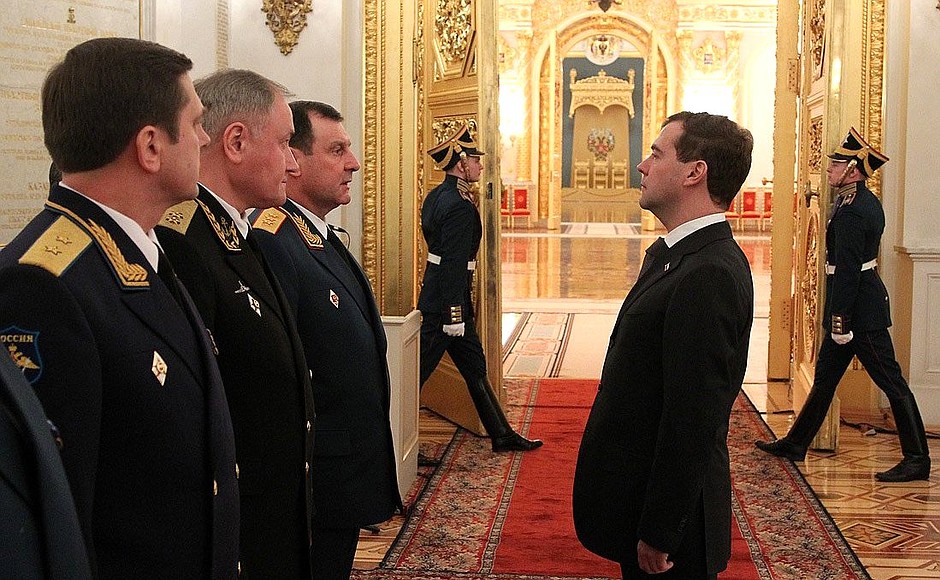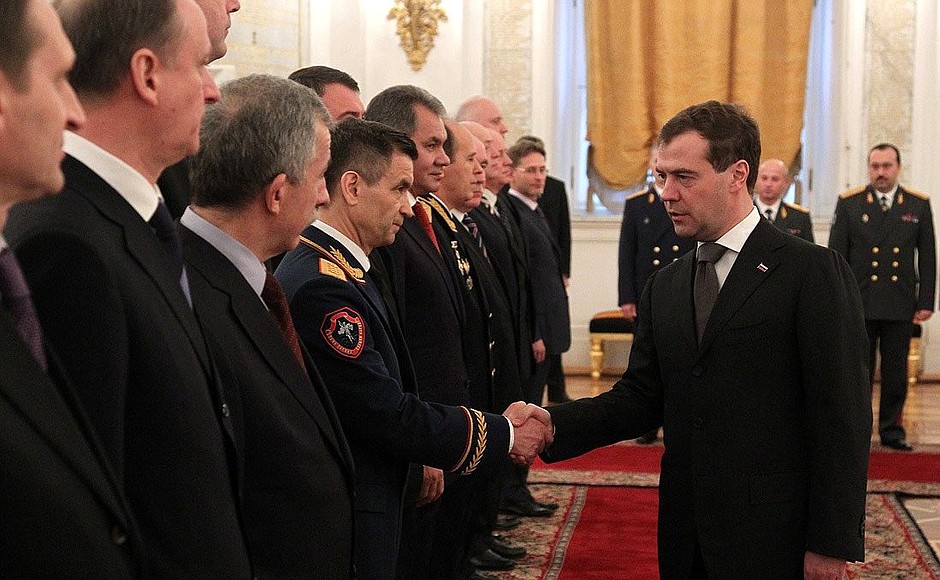Senior officers from Russia’s security and defence agencies were present for the ceremony in the Grand Kremlin Palace’s St George Hall.
* * *
President of Russia Dmitry Medvedev: Comrade officers, generals and admirals,
I open this ceremony today by congratulating you on your new promotions and appointments to top positions.
You have moved up a further stage in your careers, now heading military formations and command bodies. I hope that you will use your new powers most effectively and carry out your duties as officers in worthy fashion, reliably protecting our country’s and people’s interests.
One of the officer corps’ major tasks today is to achieve real results in successfully modernising our armed forces.
We have already completed the main organisational and staffing part of our armed forces’ modernisation. We are strengthening our strategic nuclear forces and developing a unified air and space defence system. The country’s navy is also undergoing large scale changes.
As I have said on several occasions, and say again now at this ceremony, we are planning to put more money into our national defence than ever before in Russia’s modern history. This money will be spent on supplying new equipment and ensuring modern combat preparation, and also on raising officers’ wages and resolving social issues.
Next year, wages will be indexed, and in 2012, the entire armed forces will start moving over to a new system of wage payment. The state authorities will fulfil all of their commitments in this respect. These commitments are already being fulfilled, but 2012 will see the start of a complete changeover to new arrangements for servicemen.
Ensuring a high level of national defence capability is one of the essential conditions for us to be able to carry out our strategic plans. We are therefore developing not just our armed forces but also our international cooperation in this area, with our goal being to guarantee indivisible security in Europe and throughout the world. Our recent initiatives on jointly creating a European ABM system also pursue this goal. We, in any case, see no alternative to this.
We are modernising not just our armed forces but are also reforming our Interior Ministry and taking steps to improve investigators’ and prosecutors’ performance too. This is absolutely essential today. I submitted draft laws on the police force and on the General Prosecutor’s Office Investigative Committee to the State Duma and these laws will be passed and enacted soon.
Our Interior Ministry has particularly important tasks in the North Caucasus area too, where the situation remains tense, impeding normal life, normal economic and social progress, and creating the problems we all know about. We must concentrate efforts on preventive measures to fight extremism and root out the remnants of the bandit underground.
The Interior Ministry’s task is also to maintain law and order. All public events, meetings and demonstrations must be exercised in strict compliance with the law. Illegitimate rallies of whatever nature must be halted in order to avoid violence and stop other crimes from being committed.
The recent riots and assaults in Moscow should be qualified as crimes, and the people who committed them must pay the penalty. I say this not just to the Interior Minister, but also to the Prosecutor General and Chairman of the Investigative Committee.
Acts that seek to incite hatred and enmity on ethnic or religious grounds are especially dangerous and threaten the country’s stability. The police can and must use all lawful and necessary means and powers at its disposal – and I stress this point – to counter such acts. We cannot allow anarchy on our streets and public places. Get to work on this.
Fighting terrorism is one of the Federal Security Service’s main priorities. The FSB’s special operations have prevented a whole series of terrorist attacks, and have neutralised the organisers of the criminal attacks in the Moscow metro and the blast of the Nevsky Express train. Those crimes, which killed dozens of innocent people, have been solved now.
Reliable protection of our state borders is an important part of the fight against terrorism, organised crime and drugs trafficking. The FSB border guard service must continue strengthening and equipping our state border in accordance with the approved plans.
The increase in international ties sets new tasks for other agencies too, including the Federal Guard Service and the Federal Communications Agency. Political and economic competition is growing more intense in our world today. This is not something new, but it is the reality, and it demands a higher quality of work from our Foreign Intelligence Service and the other agencies whose job it is prevent and make timely responses to potential foreign threats.
Russia will continue to do everything possible to effectively combat the drugs threat. The National Drug Control Strategy through to 2020, which has already been approved, sets the foundation for these efforts. In carrying out this strategy the Federal Drug Control Service must not only combat drug use, especially among young people, but also break up existing drug supply channels. The main thing is to focus efforts on this very important task and get all the different agencies involved.
Our society also expects to see effective results from the Federal Penitentiary Service. The concept for developing the criminal corrections system has a big part to play in this work. Its primary aim is to ensure proper conditions of detention within the prison system. We are to make faster progress in resolving the problems that we have inherited, and build what is essentially a new penitentiary system.
The Emergency Situations Ministry celebrates its 20th anniversary this month. This last summer was a serious test for everyone in the Emergency Situations Ministry. The heatwave and wild fires required the ministry to mobilise all of its resources, including for fire prevention. We have drawn the necessary conclusions and taken decisions, and now it is the task of the Emergency Situations Ministry and other organisations to implement them.
Friends, comrades, the long New Year holidays are just around the corner, but the nature of your work means that many of you will remain at your posts during this time. The situation and the duties that you perform require this. I am sure that you will do a worthy job in this work.
I wish you good health and success.
* * *
I want to add a few words. For all of you receiving new appointments or ranks today this is undoubtedly a special day. But we spend most of our time working in the field, only we all work in different fields. Some of you are really out in the field, and others are working in our towns and villages.
Compared to the way things were 10–15 years ago, we have succeeded in bringing normal life to the country overall. But this is no cause to become complacent. For a start, there are always some who do not like this normal life and pursue their own political aims instead, sometimes quite simply selfish narrow aims, undermining our social stability. We need to resolutely combat these people.
Second, we cannot afford to relax. Many of the problems in the armed forces, law enforcement agencies and special services are related to lax discipline. I want to stress this point before all of you here. Discipline is the key to resolving many different tasks. You are all officers who have sworn an oath, and you all know what discipline means. As soon as discipline weakens in one link in the chain it has a corrosive effect on the whole situation. Pay attention to discipline because it is something that we always need to improve.
One final thing, I really do hope that your new appointments and promotions help to make our country and our law and order stronger. This is especially important at a time when our country faces threats perhaps not as clear and evident as those that we faced a few years back, but at the same time, we are very much aware of the problems we have. They include extremism, terrorism in the Caucasus, corruption, and the activities of all kinds of criminal organisations. We must concentrate our greatest attention on these problems, no matter where we serve, in the armed forces, law enforcement agencies, or special services.
Once more, I congratulate you and wish you successful careers. I hope that your families will be understanding the various difficulties you encounter in your professional activities. I congratulate you on the upcoming New Year.
